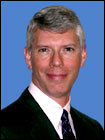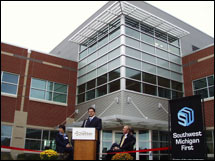New York (CNN/Money) - Debbie Oxman never harbored fantasies of becoming an entrepreneur.
But after getting laid off three times in six years, Oxman decided she could use her two decades of experience in human resources to strike out on her own.
In 2002, she opened her firm, Oxman Associates, a human resources consulting firm in Doylestown, Pa.
"I started my own company because I lost my job three times and I said 'three times and you're out,'" says Oxman, 50. "It was time to take my life in my own hands."
 |
|
| Scientist Bob Gadwood founded Kalexsyn, a drug research firm, after his old employer relocated. |
The so-called jobless recovery has made it a bumpy ride for individuals who either can't find work or who have been repeatedly bounced from job to job.
Now, many are now calling it quits on protracted job searches and companies that offer little stability. Instead, they are embracing the uncertainty of starting businesses of their own.
According to one Census Bureau study, just over 12 percent of workers (excluding farmers) are self-employed proprietors running their own "non-employer" firms -- very small businesses that do not yet have others on the payroll.
These solo operators include people like Atlanta's Jennifer Schein, 30, who founded a company called Adventure Cell, which rents satellite and GSM cell phones to business travelers and vacationers whose own phones won't work in distant parts of the globe.
Though Adventure Cell is just months old, Schein happily reports that she's starting to get repeat clients who tote her phones to places as far-flung as Australia, Honduras and Zimbabwe.
Go-go days gone
Schein learned about the phone rental business after she was hired by a cell rental company that laid her off last year. It was the second time she had been given a pink slip. The first time was in 2001, when the dot-com she worked for announced layoffs.
"I was basically more scared to work for another employer with the chance of getting laid off than to start a brand-new company where I wouldn't be sure what the outcome would be,' said Schein.
During 2001 through 2002, 1.2 million new businesses were formed in the United States, according to the Small Business Administration. That's consistent with the level of start-ups prior to the tech bust of 2000.
In other words, the era of the start-up apparently hasn't fizzled out, but it apparently has grown more subdued. Instead of flashy public offerings, there are individuals who are quietly setting up shop with little more than a vision.
 |
YOUR E-MAIL ALERTS
|
Follow the news that matters to you. Create your own alert to be notified on topics you're interested in.
Or, visit Popular Alerts for suggestions.
|
|
|
That's the case with Andrew Wohlberg, owner of a Baltimore-based publishing firm called Your World Publishing. He once assumed he'd waltz into $80,000-a-year job after getting his MBA in 2000. The job never materialized. But by Wohlberg's account, networking for a job was anything but fruitless.
"I kept meeting people who had un-sexy business ideas but were making a killing. They were doing great," Wohlberg, 34, recalls. "I thought 'You know, not everything has to go through VC funding and equity share. Try to hit a single or a double and you can do pretty well for yourself."
Your World Publishing once consisted of Wohlberg, a computer and a single client. Now he's got a network of writers and graphic artists who produce biographies for individuals and families who commission books that will preserve memories for their descendents. Corporate clients also have hired Your World to produce biographical yearbooks of their staff.
"The business has enriched my life listening to other people," says Wohlberg who finds that his business is anything but un-sexy. "It's taught me to savor and enjoy my children being children. You become conscious of the legacy you leave behind. It's been very positive."
It takes guts
That's not to say it doesn't take guts to strike out on your own, especially for those plowing hefty savings into new ventures, as Robert Gadwood, 51, has done.
 |
|
| The $14-million Innovation Center now houses 13 businesses started by laid-off Pfizer scientists. |
A chemist by training, Gadwood worked for Pfizer for 17 years before the pharmaceutical giant announced last April that it was shutting down its Kalamazoo, Mich., operations, where Gadwood managed the drug discovery research division.
He, too, became an entrepreneur almost by accident. "My father worked for the same company for almost 50 years and that's what I expected I would do," said Gadwood.
Within a week of Pfizer's layoff announcement, Gadwood and another colleague, David Zimmerman, decided to use most of their severance money to start their own company. Named Kalexsyn (a play off of Kalamazoo Expert Synthesis), it provides chemistry research services for drug makers.
For Gadwood, there were many reasons that starting a business made far more sense than looking for a new gig. With Pfizer moving out, there would be a huge talent pool of chemists for hire. Gadwood and his wife -- a physician with her practice in Kalamazoo -- didn't want to leave their home for a new employer.
Loans and other economic assistance came from the state of Michigan and from Southwest Michigan First, a privately funded economic development agency that had just opened a $14-million "Innovation Center" that's equipped with extensive labs where Kalexsyn rents space.
As it turns out, the center was conceived years ago as a hedge in case Pfizer, Kalamazoo's No. 1 employer, ever moved out of the community. It now houses 13 start-ups, many of which have been founded by former Pfizer scientists.
"We have communities in this state that never came back from job losses of 25 years ago," says Southwest Michigan CEO Barry Broom explaining the genesis of the center. " We wanted people to think of Kalamazoo as a community taking destiny in its own hands."

|